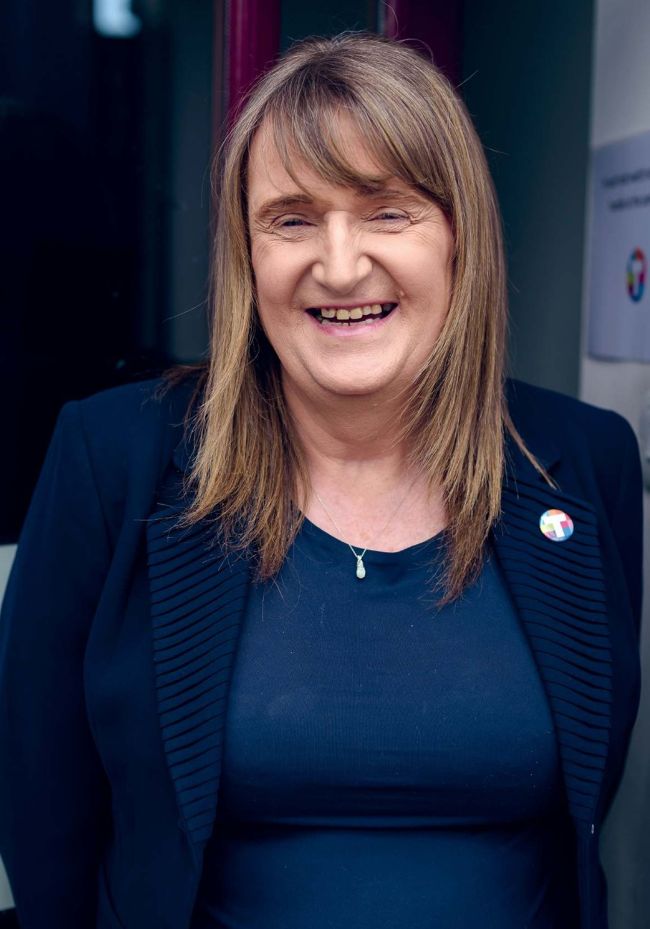Inside Out
Involved with the trans community for over 20 years and current Chair of TENI for her second term, Sara Phillips will lead this year’s Dublin Pride parade as Grand Marshal, bringing an innate punk attitude to what she says is still, at its foundation, a protest.
I was born and brought up in Wicklow town. I am the oldest of four, I have two brothers and a sister. My dad was a well-known GAA player in the 1960’s and the family were embedded in the community.

Photo by Babs Daly
Early in my childhood, I didn’t identify with my assigned gender. I remember having a conversation with my parents about being sent to the boy’s school from the convent, but when you’re eventually told, ‘This is the school you’re going to’ – you try to make the best of it.
When I was 12 my dad sat me down and said, ‘I want to be your best friend, I want you to be able to talk to me about anything’. As puberty began, things started to get more difficult. It didn’t make sense to me what was happening to my body, it didn’t feel right. When I was 17, I went to my dad and spoke about this feeling I had. I said, ‘I’ve got something I need to talk to you about and I’m just going to say it – I actually feel I’m a girl’. In fairness to Dad, he listened to me and let me explain why I felt that way, but a sign of the times, he also felt, ‘This is a phase you’re going through, you’ll be fine, just get out and play football.’ It was 1977 in Ireland – how do you transition to become female?
Back then any knowledge I would have had about being trans was from the tabloids or the television. Those stories were usually either of a voyeuristic or derogatory nature. So, I thought, is this what I want for my life? Maybe I’ll just have to suffer through this and try and deal with it as I get older.
I came out as trans in 1992. Trans life was still very underground. I remember one of the first trans people I went out with saying to me, ‘When we drive, don’t pull up beside the other car at the traffic lights so they don’t see you. When you get out of the car keep your head down.’ My attitude was: ‘I’m here, I’m out, I’m not going back.’ It was liberating, but in time, even that became restrictive.
The Dublin Trans Peer Support Group was formed in Outhouse around 2005. A friend suggested we go along and see what it was about. The first night, there were six of us, along with three facilitators.
From 2006 onwards trans people definitely started to form a community, we started to see positive role models willing to stand up and talk about not only their own stories, but about what it means to be trans. TENI (Transgender Equality Network Ireland) as we know it today was formed and we became active in fighting for our rights. In recent years, there has been a huge campaign to create positive visibility. Dr Lydia Foy’s case, although taking 22 years, laid the bedrock in later years for positive change. In 2015, the government enacted a world-leading, progressive gender recognition act based on self- determination.
TENI seeks to improve the situation and advance the rights and equality of trans people and their families. In 2012, I stood for election to the TENI board and was subsequently elected chair. Six years later, I am now in my second term as chair. Our vision is an Ireland where trans people are understood, accepted and respected, and can participate fully in all aspects of Irish society.
The Gender Recognition Bill in 2015 was our ‘decriminalisation moment’. That’s how far behind we were. If you can consider the leaps that the LGBT community made between 1993 and 2015, eventually achieving marriage equality, the trans community still have those leaps to achieve. We will probably achieve them in a shorter period of time.
In the history of the Dublin Pride parade, I’m only the third trans Grand Marshal and there has only been one other Irish trans grand marshal, my hero, Dr Lydia Foy. It’s a great honour to be able to follow in her footsteps and represent my community and the whole LGBT+ family.
We must not forget that Pride is, at its foundation, a protest. At the moment, sometimes, as we celebrate, that feels lost. There is still so much more to do. At heart I’m a punk and an activist. I collect badges, as in activist badges. My first activist badge dates back to 1978, which is the Rock Against Racism marches in London and the connection came from punk. Punk attitude is one of protest, and I will continue to protest while the trans community and the whole of the LGBT family are denied full equality.
I made the decision to ask my mum to accompany me to Pride. My parents have been very much my rock throughout my whole life. So, my 83 year-old mum is going to get her first experience of Pride at the front of the parade with me. I’m really looking forward to spending the day with her.
To find out more about how TENI can support you, visit www.teni.ie